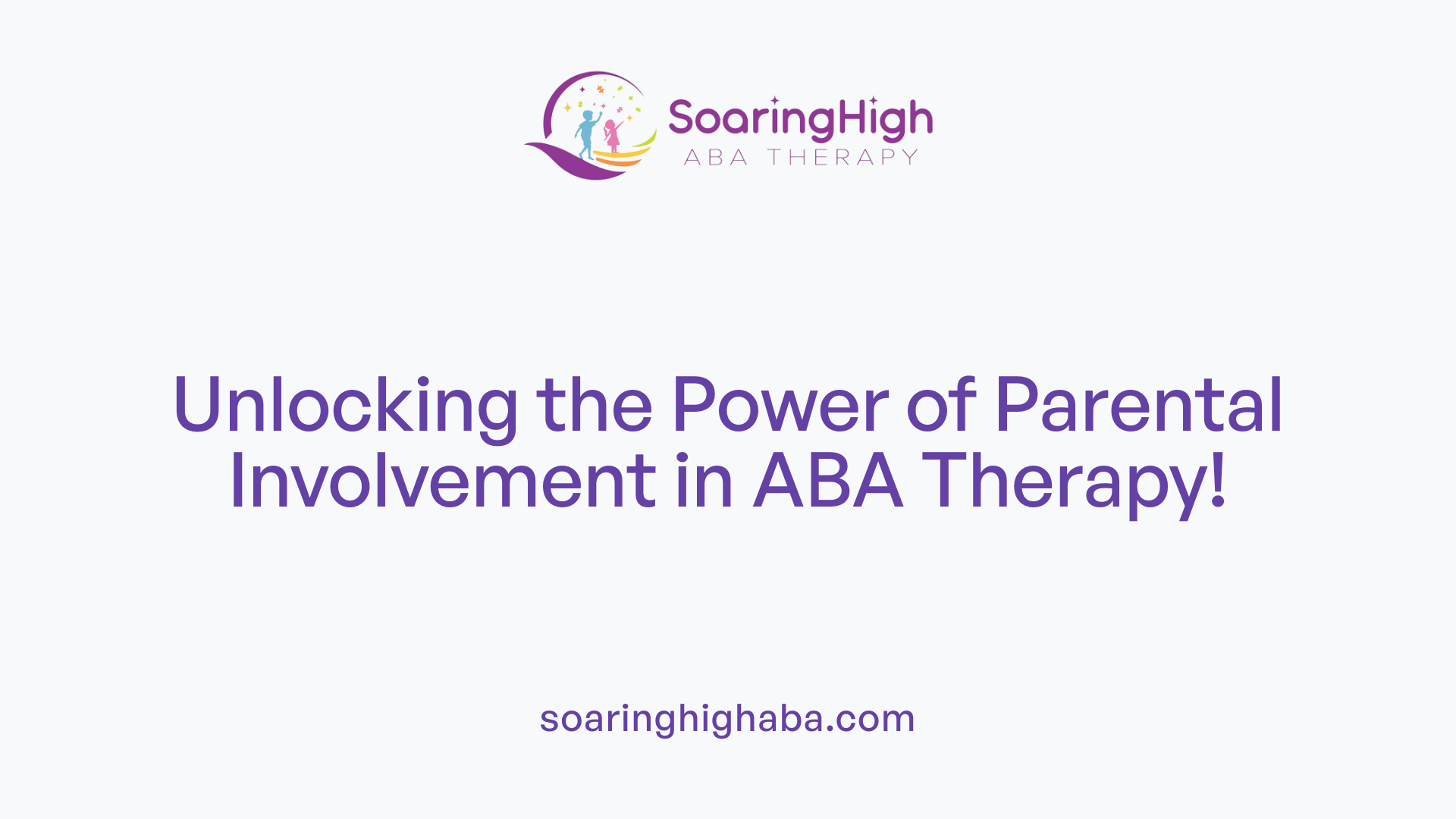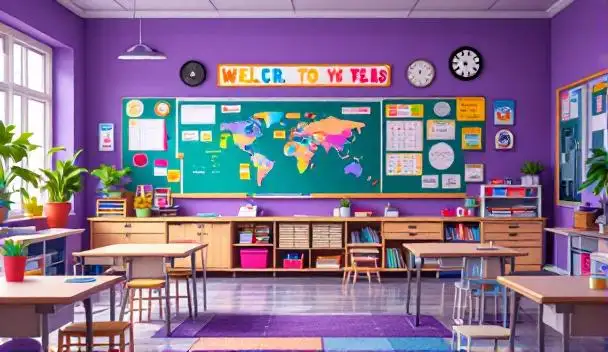Exploring the Collaborative Role of Parents
Applied Behavior Analysis (ABA) therapy has long been regarded as a leading treatment for children with Autism Spectrum Disorder (ASD). Yet, its success hinges not only on the expertise of therapists but significantly on the involvement of parents. This article delves into the transformative impact of parental participation in ABA therapy and offers insights on collaborative strategies that enhance therapeutic outcomes.
Bridging the Gap Between Therapy and Daily Life

What is the impact of parental involvement on the outcomes of Applied Behavior Analysis (ABA) therapy for children with Autism Spectrum Disorder?
Parental involvement is fundamental for the success of Applied Behavior Analysis (ABA) therapy for children with Autism Spectrum Disorder. When parents actively participate, they help reinforce learned skills in everyday situations, effectively bridging the gap between therapy and daily life. This level of engagement ensures that skills are consistently practiced, enhancing the child's ability to generalize what they have learned.
Collaboration with therapists is also crucial in this process. By working together, parents and therapists can set measurable goals that track progress and celebrate milestones. This continuous feedback loop fosters a stronger therapeutic partnership, making adjustments as needed to meet the child’s evolving needs.
Involvement in therapy can significantly boost parental self-efficacy. Parents who are active participants tend to feel more confident in their ability to support their child, leading to improved outcomes for the child. This is beneficial not only in terms of skill acquisition but also in creating a nurturing home environment that encourages emotional and social development.
In summary, an engaged parental role in ABA therapy not only strengthens the overall effectiveness of interventions but also contributes positively to the child’s development and the family dynamics. With parents as crucial allies in the treatment process, children are more likely to experience consistent reinforcement and sustained progress in their skills.
Maximizing Therapy Effectiveness Through Parental Actions

How do parents enhance the effectiveness of ABA therapy through active participation?
Parents significantly enhance the effectiveness of ABA therapy through active participation in several ways. Firstly, collaboration with therapists enables parents to personalize treatment plans that cater to their child's unique needs. Research suggests that parental involvement correlates with improved therapy outcomes, especially when parents consistently reinforce skills learned during therapy sessions.
By setting defined goals alongside therapists, parents can better track their child's progress and establish opportunities for practicing skills in everyday situations. This approach aids in the generalization of learned behaviors beyond the therapy setting, thus supporting a child's development in various environments.
Open communication between parents and therapists further strengthens this process. It fosters a relationship built on trust, where parents can share observations, provide valuable feedback, and suggest adjustments as needed. Such interactions are critical for refining therapy plans based on real-time insights, ultimately creating a more adaptive treatment approach.
Parent involvement goes beyond mere participation; it fosters a nurturing atmosphere that nurtures the parent-child bond. It encourages active engagement, resulting in a supportive learning environment that enhances the overall efficacy of ABA therapy.
Understanding the Multiple Benefits of Parental Engagement

What are the benefits of parental engagement in ABA therapy?
Parental engagement in ABA therapy is crucial for the success of treatment outcomes, as it fosters improved cognitive and behavioral development in children. Research indicates that when parents are actively involved, children can generalize learned skills to home and community settings, enhancing their overall learning experience.
Moreover, parental participation creates consistency between therapy sessions and daily life, which is essential for reinforcing positive behaviors. When parents are equipped with ABA techniques, they can effectively apply these strategies in a supportive home environment. This not only leads to better outcomes for the child but also reduces stress and improves family dynamics overall.
Another significant aspect of parental involvement is the empowerment it brings to parents. By observing therapy techniques, parents can integrate these into everyday routines, ensuring ongoing support and development for their child. They become advocates for their children, helping to navigate educational and therapeutic services.
In summary, collaboration between parents and ABA professionals aligns therapy goals while building a robust support system that significantly enhances a child's developmental trajectory and enriches family interactions.
Practical Home Strategies for Parents

What practical strategies can parents use to support their child's ABA therapy at home?
Parents can significantly enhance their child's ABA therapy at home by focusing on two main strategies: establishing routines and implementing reinforcement methods.
Establishing Routines
Creating structured daily routines helps children with autism thrive, providing them with the predictability they need. Parents can use visual schedules to outline daily activities, making transitions smoother and less anxiety-inducing. Involving children in everyday tasks, such as mealtime, following a consistent sequence can reinforce learning while maintaining focus on desired behaviors.
Implementing Reinforcement Methods
Positive reinforcement is crucial for encouraging desired behaviors and teaching new skills. Parents can reward their children with praise, small incentives, or extra playtime when they demonstrate appropriate behaviors or achieve specific goals. To maintain motivation, introduce fun and engaging activities that can reinforce skills learned during therapy sessions. Parents should break tasks into smaller, manageable steps to ensure children experience success and build confidence.
In addition to these strategies, actively engaging in therapy techniques observed during sessions ensures consistent application. Regular communication with therapists enhances understanding and allows parents to tailor approaches suitable for their child’s unique needs. Ultimately, these strategies foster a supportive environment that maximizes the benefits of ABA therapy.
The Integral Role of Parents in Therapy Progress

What role do parents play in improving therapeutic progress in ABA therapy?
Parents are foundational pillars in the therapeutic journey of children undergoing Applied Behavior Analysis (ABA) therapy. Their active involvement plays a crucial role in enhancing therapeutic progress by ensuring consistency and effective application of behavioral interventions in daily routines.
Consistency and Reinforcement
Parental engagement significantly reinforces the skills that children learn during therapy. By applying ABA strategies and techniques at home, parents help children generalize these skills across various settings, which is vital for their cognitive and developmental growth. Consistent reinforcement ensures that the skills retained in therapy are also applied in real-life situations.
Parent-Therapist Collaboration
Collaboration between parents and therapists is another vital component that contributes to effective treatment. Regular communication allows therapists to share tailored strategies that address the specific needs of each child, while parents can provide immediate feedback based on their observations at home. This synergy ensures that strategies employed during therapy are effectively mirrored in a child's home environment, fostering a unified approach to their development.
Overall, active parental participation not only drives better therapeutic outcomes but also strengthens the bond between parents and children, promoting a supportive environment that encourages enthusiastic participation in the child's ongoing learning and growth.
Research Insights: The Critical Importance of Family Involvement
What research findings highlight the importance of family involvement in ABA therapy?
Research findings underscore the critical role of family involvement in ABA therapy, showing that engaged parents significantly enhance treatment outcomes for children with Autism Spectrum Disorder (ASD). A study on a parent-led ABA treatment model demonstrated that when parents are trained and involved, children exhibit notable improvements in adaptive behaviors and reductions in interfering behaviors, particularly in severe cases.
Increased parental involvement correlates with a better quality of life for families. Active parental roles help lower stress levels and boost self-efficacy, leading to a more supportive home environment. Furthermore, parental participation ensures that skills learned in therapy are effectively generalized to home and community settings, thereby reinforcing children's learning and skill retention.
Why is parental empowerment crucial in treatment?
Parental empowerment is a vital component of effective therapy. When parents actively engage in their child's treatment process, they gain valuable insights that allow them to support their child's development meaningfully. Understanding the assessment process and applying therapeutic techniques at home enables parents to enhance their child's learning. This involvement not only facilitates better communication between parents and therapists but also ensures that interventions are tailored to meet a child’s unique needs.
Moreover, families who adopt a collaborative approach with therapists can set consistent routines and strategies at home, further promoting their child’s progress. Research consistently highlights that family engagement is essential for maximizing the effectiveness of ABA therapy and achieving favorable outcomes for both children and their families.
| Aspect | Impact on Children | Impact on Families |
|---|---|---|
| Parental Involvement | Enhances skill generalization | Lowers stress levels |
| Active Engagement | Promotes learning retention | Increases self-efficacy |
| Collaborative Approach | Tailors interventions | Improves quality of life |
Empowering Parents Through ABA Training
How does parental training enhance home application of skills?
Parental training is a cornerstone of Applied Behavior Analysis (ABA) therapy, equipping parents with essential techniques to support their child’s development. This active involvement enhances not just the therapy's effectiveness but fosters a sustained learning environment at home. By learning and applying these strategies, parents become confident advocates for their children's needs, facilitating better communication with therapists.
Training sessions focus on practical skills parents can implement daily. These include reinforcing learned behaviors and maintaining consistency in routines. Active participation enables parents to observe therapy techniques firsthand, making it easier to generalize these practices outside the therapy room.
What skills do parents gain through training?
Through ABA training, parents acquire a variety of skills, including:
| Skills | Description | Benefits |
|---|---|---|
| Observational Skills | Learning to identify their child's behaviors | Tailors feedback for therapy plans |
| Reinforcement Strategies | Implementing positive reinforcement techniques | Encourages desired behaviors effectively |
| Communication Techniques | Improving dialogue with therapists | Enhances team collaboration |
| Consistency in routines | Maintaining a structured environment | Supports effective skill generalization |
These skills not only contribute to the child’s progress but also create a nurturing atmosphere crucial for emotional and social development. In essence, parental training fosters a bridge between therapy and daily life, enabling children with Autism Spectrum Disorder to thrive in various environments.
Ensuring Continuity Between Therapy and Home
Home Environment Setup
Creating a supportive home environment is essential for children with Autism Spectrum Disorder (ASD) to thrive. Parents can establish routines that reflect the strategies learned during therapy sessions. This consistency helps reinforce the skills taught in therapy and gives the child a structured framework for applying them in real-life situations.
By tailoring the environment to accommodate the child’s needs, parents can reduce distractions and enhance focused learning. This setup may include designated spaces for specific activities or visual supports that help children understand and navigate their daily routines effectively.
Reinforcement of Therapy Strategies
Parents play a pivotal role in ensuring that strategies learned in ABA therapy are consistently reinforced at home. By engaging in activities that mimic therapy exercises, parents can encourage skill generalization. For instance, if a child learns a communication approach during therapy, parents can practice this in daily conversations, ensuring skills transition smoothly from theoretical knowledge to practical use.
Additionally, frequent communication with therapists enables parents to provide essential feedback on their child's responses, which can then inform therapy adjustments as needed. Involving parents in this way not only empowers them as advocates for their child's development but also contributes to better outcomes, demonstrating the profound impact of parental involvement in maintaining therapeutic continuity.
The Importance of Open Communication with Therapists
Feedback and communication
Open communication between parents and therapists is fundamental to maximizing the effectiveness of ABA therapy. Parents provide real-time feedback about their child’s responses during sessions, which is essential for monitoring progress and making necessary adjustments to treatment plans. This collaborative approach helps tailor interventions to meet the child's unique needs more effectively.
Joint decision-making
When parents actively participate in decisions regarding their child’s therapy, they become empowered advocates for their child's well-being. Their insights into the child’s daily behaviors and challenges equip therapists with valuable information to refine therapeutic strategies. Together, parents and therapists can discuss progress, celebrate successes, and address any concerns, fostering a supportive environment that enhances emotional well-being for both the child and family.
Digital Tools for Enhanced Parental Involvement
Use of Technology in ABA
Integrating technology into Applied Behavior Analysis (ABA) therapy has transformed how parents engage in their child's treatment. Tools such as apps and online platforms offer parents the capability to track progress, reinforce skills, and access resources. For instance, mobile applications can provide video demonstrations of techniques and strategies parents can implement at home, making it easier to ensure consistency.
Real-Time Feedback and Data
One of the significant advantages of technology in ABA is the provision of real-time feedback. Digital platforms can analyze a child's progress instantaneously, allowing parents to receive insights into their child's learning. This immediate feedback loop empowers parents, enhancing their ability to reinforce therapeutic strategies effectively. Regular updates and analytics foster open communication between therapists and families, ensuring interventions are tailored to the child’s evolving needs.
Comprehensive Support through Digital Means
By using these digital tools, parents can work closely with therapists to create a structured and cohesive learning environment. This collaboration helps enhance the overall effectiveness of ABA therapy, contributing to better long-term outcomes for children on the autism spectrum.
Towards a Collaborative Approach
Parental involvement in ABA therapy is not just beneficial—it's essential. When parents actively collaborate with therapists, they create a seamless, supportive environment that fosters continuous learning and growth for their children. By honing their skills, maintaining consistency, and embracing technology, parents can significantly enhance the effectiveness of ABA therapy, paving the way for improved developmental outcomes and enriched family dynamics. As both partners in their children's therapeutic journey, parents and therapists can create empowering relationships that drive successful interventions and brighter futures.
References
- Parents' Involvement in ASD Treatment: What Is Their Role?
- How Parent Involvement leads to Successful Outcome in ABA
- Parent Involvement in Kids ABA Therapy - ABATherapistJobs.com
- The Role of Parental Involvement in ABA Therapy: Why It Matters
- Enhancing Autism Therapy: The Impact of Family Involvement
- Parent Involvement is Crucial for Successful ABA Programs
- The Impact of Family Involvement in ABA Therapy





































































































